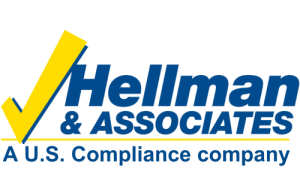Weathering the Storm: Effective Storm Water and Hazardous Waste Management Strategies
At Hellman & Associates, we understand the critical importance of environmental health and safety (EHS) compliance, especially when it comes to managing stormwater and hazardous waste. With over two decades of experience in providing outsourced EHS compliance management services, we’ve honed our strategies to help businesses navigate the complexities of regulatory requirements while prioritizing the safety of their workforce and the preservation of the environment.
In today’s blog post, we delve into the realm of stormwater and hazardous waste management, exploring best practices and strategies to mitigate risks and ensure compliance.
Understanding the Importance of Effective Management
Stormwater runoff and hazardous waste pose significant risks to both the environment and human health if not managed effectively. Stormwater runoff can carry pollutants such as sediment, chemicals, and heavy metals, contaminating water bodies and threatening aquatic ecosystems. Similarly, improper handling and disposal of hazardous waste can lead to soil and groundwater contamination, posing serious health risks to communities and wildlife.
To address these challenges, businesses must implement robust management strategies that not only comply with regulatory requirements but also prioritize environmental stewardship and sustainability.
Best Management Practices for Stormwater Management
- Riparian Corridors/Buffers: Riparian corridors or buffers are vegetated areas along water bodies that help filter pollutants from stormwater runoff, prevent erosion, and provide habitat for wildlife. By preserving and enhancing riparian areas, businesses can effectively mitigate the impacts of stormwater runoff on water quality and biodiversity.
- Protect Sensitive and Special Value Features: Identify and protect sensitive areas such as wetlands, water bodies, and wildlife habitats from development and pollution. Implementing measures to safeguard these features not only ensures regulatory compliance but also preserves valuable ecosystems and natural resources.
- Protect/Utilize Natural Flow Pathways: Incorporate natural flow pathways into stormwater planning and design to mimic the natural hydrological cycle. By preserving and utilizing natural drainage patterns, businesses can reduce the volume and velocity of stormwater runoff, minimizing erosion and sedimentation in water bodies.
- Cluster Uses and Minimize Disturbance: Cluster development activities at each site and minimize the total disturbed area to reduce the footprint of construction and development. By concentrating activities in smaller areas and minimizing grading and soil compaction, businesses can preserve natural landscapes and minimize the disruption of ecosystems.
- Use Smart Growth Practices: Embrace smart growth principles such as mixed land use, compact development, and transit-oriented design to minimize urban sprawl and reduce the impact of development on stormwater runoff. By promoting sustainable development patterns, businesses can create resilient communities that are better equipped to manage stormwater and protect natural resources.
Implementing Effective Hazardous Waste Management Strategies
In addition to managing stormwater, businesses must also prioritize the safe and responsible handling of hazardous waste. From hazardous materials storage to waste disposal, implementing effective management strategies is essential to prevent environmental contamination and ensure regulatory compliance.
- Proper Storage and Labeling: Store hazardous materials in designated areas equipped with appropriate containment measures to prevent spills and leaks. Ensure proper labeling of containers to clearly identify the contents and hazards associated with the materials.
- Spill Prevention and Response: Develop and implement spill prevention and response plans to mitigate the risks of accidental releases of hazardous materials. Provide training to employees on proper spill response procedures and ensure the availability of spill containment kits and cleanup materials.
- Waste Minimization and Recycling: Implement waste minimization strategies to reduce the generation of hazardous waste and promote recycling and reuse of materials whenever possible. Evaluate processes and practices to identify opportunities for waste reduction and resource conservation.
- Compliance Monitoring and Reporting: Establish procedures for monitoring and documenting compliance with hazardous waste regulations, including recordkeeping and reporting requirements. Conduct regular inspections of storage and handling areas to ensure compliance with applicable regulations.
- Training and Education: Provide comprehensive training and education programs to employees on the proper handling, storage, and disposal of hazardous materials. Ensure that employees are aware of the potential hazards associated with their work activities and equipped with the knowledge and skills to mitigate risks effectively.
Partnering with Hellman & Associates for Effective Compliance Management
At Hellman & Associates, we specialize in providing comprehensive EHS compliance management services tailored to the unique needs of each client. From stormwater management to hazardous waste handling, our team of experts works closely with businesses to develop and implement effective strategies that protect the environment, ensure regulatory compliance, and promote workplace safety.
Through our ASSUREDCompliance® program, we offer an annual partnership that guarantees compliance with OSHA and other regulatory agencies, providing clients with the peace of mind of a safe workplace and a 98% renewal rate. With our commitment to safety and environmental stewardship, we help businesses weather the storm of regulatory challenges and achieve their sustainability goals.
In conclusion, effective stormwater and hazardous waste management are essential components of responsible business practices. By implementing best management practices and partnering with experienced professionals like Hellman & Associates, businesses can mitigate risks, ensure compliance, and contribute to a healthier and more sustainable future for generations to come.
Weathering the Storm: Effective Storm Water and Hazardous Waste Management Strategies Read More »
